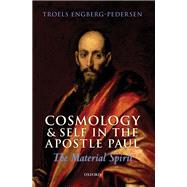
Note: Supplemental materials are not guaranteed with Rental or Used book purchases.
Purchase Benefits
Looking to rent a book? Rent Cosmology and Self in the Apostle Paul The Material Spirit [ISBN: 9780199596744] for the semester, quarter, and short term or search our site for other textbooks by Engberg-Pedersen, Troels. Renting a textbook can save you up to 90% from the cost of buying.
| Introduction | p. 1 |
| A Stoic Understanding of the Pneuma and Resurrection in 1 Corinthians 15 | p. 8 |
| Looking for a Real World-View | p. 8 |
| A 'History of Salvation' | p. 10 |
| Modern Understandings of the Pauline Pneuma | p. 14 |
| The Philosophical Context: Cicero on Pneuma and God | p. 19 |
| The Philosophical Context: The Wisdom of Solomon and Philo on Pneuma and God | p. 22 |
| Stoic Cosmology in 1 Corinthians 15:35-49 | p. 26 |
| Stoic Cosmology in 1 Corinthians 15:50-5 | p. 31 |
| 'Apocalyptic' and Philosophical Cosmology in Paul | p. 37 |
| The Bodily Pneuma in Paul | p. 39 |
| Broader Questions about the Pneuma | p. 39 |
| The Pneuma and Resurrection in Philippians and their Present Implications | p. 41 |
| The Pneuma and Resurrection in 2 Corinthians 4:7-5:10 and their Present Implications | p. 46 |
| Conformity with Christ in His Death and Resurrection: Romans 8:10, 8:14-30, and 6:2-6 | p. 51 |
| The Relationship between Christ and the Pneuma | p. 55 |
| Paul's Conception of God | p. 58 |
| The Ontology of the Pneuma 'Itself' | p. 61 |
| The Pneuma Outside and Within Human Beings | p. 66 |
| The Gift of the Pneuma: When? | p. 67 |
| The Gift of the Pneuma: How? | p. 70 |
| Prayer and the Pneuma | p. 73 |
| Physics, Cognition, and Superhuman Persons | p. 75 |
| Three Types of Discourse | p. 75 |
| The Cognitive Role of the Pneuma | p. 76 |
| Physics, Cognition, and Personhood | p. 80 |
| Examples of Overlap-and the True Contrast | p. 83 |
| Christ in the Underworld, Paul in Heaven | p. 87 |
| Beyond the Elements of the World | p. 90 |
| The Pauline Geisterwelt: Angels, Demons, Satan | p. 92 |
| Is the Stoic Picture of the World More Optimistic than Paul's? | p. 98 |
| Paul's Cosmological cum 'Apocalyptic' Anthropology | p. 102 |
| Divine and Human Agency and Freedom | p. 106 |
| Overview | p. 106 |
| Epictetus: Three Questions | p. 109 |
| Epictetus: The Human Being on the Scala Naturae | p. 111 |
| Epictetus: Prohairesis | p. 112 |
| Epictetus: Prohairesis and the Human Relationship with the Body and the World | p. 114 |
| Epictetus: Prohairesis and the Human Relationship with God | p. 116 |
| Epictetus: A Personalist (and Physicalist) Conception of God-and a Cognitivist One | p. 118 |
| Epictetus: Divine and Human Agency | p. 119 |
| Paul: Introduction | p. 121 |
| Transferrals of Agency | p. 123 |
| Divine Agency in Conversion | p. 125 |
| Divine Agency vis-à-vis Non-Christ-Believers | p. 126 |
| Divine and Human Agency after Conversion | p. 127 |
| Summary on Paul | p. 128 |
| Comparison with Epictetus | p. 131 |
| Conclusion | p. 137 |
| From the Self to the Shared | p. 139 |
| A Change of Gear | p. 139 |
| Bourdieu's Concept of Habitus | p. 141 |
| The Pauline Language of Experience | p. 142 |
| Foucault's Concept of Subjectification | p. 145 |
| Overview: Three Texts, Three Topics | p. 147 |
| Philippiahs 3:4-11: Paul Himself | p. 147 |
| Philippians 3:12-4:1: Paul and the Addressees | p. 153 |
| The Underlying Missionary Logic of Philippians 3:4-4:1 | p. 155 |
| The Converted Self in Galatians 1-2 and 6 | p. 157 |
| The Shared Habitus in Galatians 5 | p. 162 |
| A Generalized Self-Account and Its Paraenetic Purpose in Romans 7-8 | p. 164 |
| The Christian Habitus in 1 Corinthians | p. 169 |
| Bodily Practice | p. 172 |
| The Special Contours of the Christian Habitus | p. 172 |
| Metaphorical Speech in Paul | p. 173 |
| The Physical Underpinning of Paul's Cognitive and 'Ethical' Language | p. 175 |
| Paul's Christian Habitus in Context: A Breakthrough | p. 182 |
| Paul's Christian Habitus Now? | p. 193 |
| The Initial Transmission and Reception | p. 194 |
| Paul's Bodily Practice in 2 Corinthians 1-7 | p. 198 |
| Paul's Letter-Writing as a Bodily Practice | p. 205 |
| Notes | p. 208 |
| Bibliography | p. 254 |
| Index Locorum | p. 271 |
| General Index | p. 280 |
| Table of Contents provided by Ingram. All Rights Reserved. |
The New copy of this book will include any supplemental materials advertised. Please check the title of the book to determine if it should include any access cards, study guides, lab manuals, CDs, etc.
The Used, Rental and eBook copies of this book are not guaranteed to include any supplemental materials. Typically, only the book itself is included. This is true even if the title states it includes any access cards, study guides, lab manuals, CDs, etc.